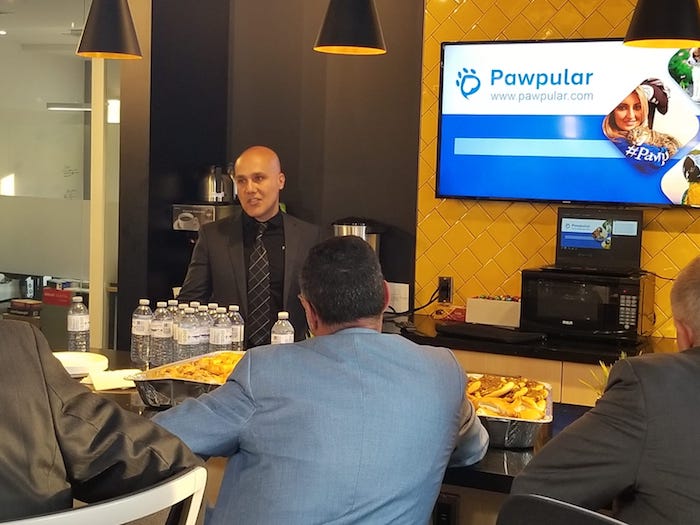From disrupting ads through machine learning to building a pet society in Canada and the US, LebNet Toronto’s event on June 19 had something for everyone.
Gathered at VentureX Canada, 30 people showed up to listen to Hisham Ghostine, CEO and President – Media Brands at Dentsu Aegis Network Canada and Pele Dagher, founder and CEO of Pawpular App Inc., talk about their expertise and journey.
Prior to moving to Canada, Ghostine was the Chief Revenue & Growth Officer for Omnicom Media Group in the Middle East and Africa, growing the Omnicom network footprints through acquisition and new operations. In his new role, he is in charge of seven media and performance companies.
 The NLP challenge: over 6,500 languages and 3,900 emojis
The NLP challenge: over 6,500 languages and 3,900 emojis
Ghostine’s talk focused on the complexity of understanding the constantly increasing languages by machines and how the natural language processing (NLP) is helping marketers understand their audiences and predict their behaviour.
The world has now over 6,500 languages, he said, and the number keeps increasing on a daily basis as new language combinations are being formed. People keep introducing new items and characters and we now have more than 3,900 emojis. That number increases by 10 percent every year.
These numbers pose a huge challenge for NLP, especially that individuals write and use words differently to express different emotions. Yet as Ghostine explained in his presentation, NLP has come a long way to solve understanding the human text and speech. Through machine learning (ML), NLP is able to analyse patterns and trends and through deep learning (DL), algorithms are trained to understand human’s intention. Which means that NLP is helping marketers now understand consumers’ intentions, sentiments and behaviours and targeting them better.
That said, user data collected from social media are now more accurate than polls and statistics, because they reflect users’ reactions, behaviours and feelings rather than pure numbers. Yet NPL still has several challenges to solve. Ghostine listed three:
- Context classification: “Classification will help us in the future to analyse intentions from a picture, based on previous examples.”
- Solid intent mining: “We understand that someone wants to travel, but we don’t know if they want to take a flight, train, car..”
- Improve algorithm statistical relationship: “We want to create a link between images and texts.”
When ads serve unwanted territories
When marketers place an ad online, they face the risk of having their ad delivered to unsafe places. This is why they create white and black lists and set a number of keywords to guide them. Yet such strict guidelines mean that marketers are limiting themselves to a smaller ad space, without taking into consideration that some of the black listed keywords might carry a positive message if used in a different context.
New ML and DL research, according to Ghostine, are coming up with effective solutions to recognize images and detect positive versus negative content. “Up to 60% of those black listed words had positive meaning. Prevention will free up billions of dollars worth of ad space now because we’re solving an economy problem,” he concluded.
Turning a passion for pets into a business
After spending 18 years founding and growing businesses with 8 years in high tech roles, Pele Dagher followed his passion for pets and launched Pawpular. Headquartered in Toronto, his company is a pet society and pet care services application.
And there’s a huge market for it.
In the US alone, 80 billion dollars is being spent yearly on 395 million pets, Dagher said. In Canada, it’s 10 billion dollars on 20 million pets. He is currently focusing on these two markets.
On Pawpular, a pet owner will have a customized profile, connect with other users, find a local service provider (walkers, groomers, pet day care, pet hotels and vets), rate and review services, adopt, get notified if someone nearby lost their pet, and ask questions.
Service providers will get more visibility and attract new customers, book and manage appointments, assign jobs to team members, send offers and interact with customers among other features.
Pawpular has 50,000 users to date, of which 10,000 are active daily. It generates revenue by charging its 1,500 service providers with a monthly fee ranging between 10 to 50 dollars.
In the near future, Dagher will launch a store within the app where users can also buy products from the app. They will also be working with insurance companies to offer competitive prices to pet owners and feature a Bluetooth tracker. In the next two years, he will be expanding to new countries.
Similar to many other companies, Pawpular is leveraging the power of data to cater to its users (someone looking to adopt a pit bull dog in a certain area) and providing customer insights to service providers.
Data is what will anchor all ships to safety moving forward and Dentsu and Pawpular are surely taking note.

